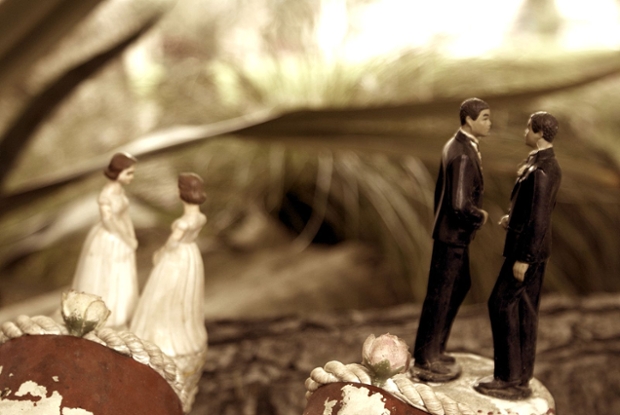Same-gender marriage, slavery, and the Holocaust

Bernadette J. Brooten is the Robert and Myra Kraft and Jacob Hiatt Professor of Christian Studies
On June 4, the U.S. Supreme Court decided that religious animus on the part of a Colorado Civil Rights Commissioner prevented an Evangelical Christian baker from a fair hearing on his refusal, on religious grounds, to bake a wedding cake for a gay male couple. Evangelical Christian rejection of LGBTIQ rights may seem a uniquely modern phenomenon. But the refusal to make a wedding cake for a same-sex couple has its roots in a longstanding history of Biblically-justified actions in opposition to the rights of other groups.
The Colorado commissioner was clearly hostile to baker Jack Phillips’s sincerely held religious belief, which he calls “one of the most despicable pieces of rhetoric that people can use…to use their religion to hurt others.” He did, however, correctly point to a long history of religious justifications for discrimination, among which were slavery and the Holocaust. Before dismissing this as inflammatory and prejudicial, we need to take a sober look at history.
First, to be sure, although LGBTIQ persons have experienced oppression, violence and prejudice – and still do – this denial of services is not the equivalent of centuries-long massive enslavement or the murder of 6 million Jews, in addition to other despised groups under the Third Reich. We nevertheless need to recognize that, in their day and time, scholars and theologians put forth serious arguments in support of slavery and Jewish inferiority. And, just as today, religious people were split.
Christians tolerated slavery throughout most of Christianity’s history. As late as 1866, the Vatican stated: “It is not contrary to natural and divine law for a slave to be sold, bought, exchanged, or given.” Protestants argued that biblical laws on how to treat slaves, and on how enslaved persons should obey their masters (and mistresses) in all things, show that there is no Christian reason to reject it. Throughout their religions’ long histories, Jews, Christians, and Muslims set down religious laws regulating slavery. Only a few within these communities opposed slavery outright, although numerous 19th century abolitionists were religiously motivated. But Christian pro-slavery advocates sincerely believed that slavery was a legitimate way to organize work and life in accordance with God’s plan, and that their religious forms of slavery were benign. They also believed that slavery brought Africans the benefit of the Gospel.
Even as late as 1997, Steve Wilkins and Douglas Wilson, in Southern Slavery as It Was, presented Southern slavery as a benign, paternalistic, Christian institution with stable slave families and a harmonious multi-racial society with extremely limited sexual exploitation or other abuses. Wilkins and Wilson see the connection between slavery and “sodomy.” They argue that if “those who hate the Word of God” criticize one part of the Bible, such as its toleration of slavery, Christians will have a hard time defending other parts, such as the Bible’s rejection of “sodomy” and promotion of wifely submission. Christians should, therefore, not apologize for biblical teachings on slavery. These were all sincerely held religious beliefs. Today, of course, most Christians reject slavery, but the desire among some Christians for the Bible to be the basis of public policy and law remains. Those Christians who reject same-gender marriage feel the loss of that biblical foundation of society.
The Holocaust had many causes, only some of which were Christian. The long history of Christian persecution of Jews was, however, the backdrop, and Christian Nazis provided valuable moral cover. Theologian Gerhard Kittel saw himself as a good Nazi, one who engaged his fellow Nazis to make the party more Christian. He probably contributed more to the mass murder of Jews than any other Christian theologian. He spoke frequently of the need for a “final solution” as to what should be done with and to the Jews. His 1933 volume, The Jewish Question, considered the option of extermination, but rejected it as impractical, even as his speaking and publications on the Jewish religion contributed to it. Similarly, as Susannah Heschel has meticulously researched, Walter Grundmann created an image of Jesus as Aryan. These theologians sincerely held the belief that Jews were religiously inferior, and acted on those beliefs as best they could.
Jack Phillips has support in the Bible and in Christian tradition for rejecting same-gender marriage. The biblical Book of Leviticus condemns at least some male-male sexual acts, and the Apostle Paul’s Letter to the Romans defines female-female and male-male sexual acts as unnatural and a result of having turned away from God. Biblical teachings on female subordination and wifely obedience preclude same-gender marriage by defining marriage as a natural hierarchy: How can the wife obey her husband if there is no wife? How can a woman lead a life of humble submission to her husband when two women join together in love? For Phillips and others, truly loving one’s fellow human beings means standing witness to God’s will for them; even though other Christians may find a profound lack of charity in such actions.
Categories:





